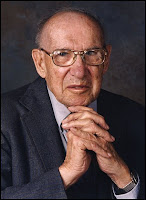Peter Drucker (1909-2005) from Vienna, Austria, was a hugely influential figure in modern management. He studied in Frankfurt but moved to England where he worked in journalism and banking. Moving again to the US in the 1930s, he became a professor at Bennington College in Vermont.
Management
Some concepts were literally invented by him, including ‘Management by objectives’ (MBO), the idea of the ‘knowledge worker’ and ‘decentralisation’ but he also stressed the human dimension of management.
His seminal book The Practice of Management (1954) introduced the concept of management by objectives (MBO) and decentralization. He introduces a more thorough method for management in Management: Tasks, Responsibilities, Practices (1973), a wider book that delves into more detail, describing the roles and responsibilities of managers. Later in life he was interested in Innovation and Entrepreneurship (1985) where he sees ‘systematic innovation’ as an intrinsic feature of business.
Leadership
Peter Drucker, although known primarily for his contributions to management theory, also offered insights into leadership. Tellingly, he never wrote a book dedicated to the topic. His views on leadership were always integrated into his broader discussions on management and organisational structure. In that sense he held back from much of the hubris that can attend modern theory and courses on leadership. His vision was more of a calm and serious form of leadership and management.
He did see a distinction between management and leadership, management being about doing things right, while leadership was about doing the right things. Leadership involves managing oneself, taking personal responsibility rather than using rank and status, also setting the right direction and vision for an organisation, whereas management involves the execution of organisational strategies.
In Management Challenges for the 21st Century (1999) he wrote about leadership as a liberal art, where he integrated concepts from history, sociology, psychology, philosophy, and theology. Interestingly, he saw leadership as requiring a broad understanding of the human condition and society. This is why he stressed the importance of integrity and ethics in leadership, making decisions not only on effectiveness but also on moral grounds. There is the additional roles of fostering innovation and handling. Good leaders anticipate changes in the external environment and adapt their strategies.
He was also interested in how organisations can develop effective leaders. He believed in cultivating leadership skills at all levels of an organization and was one of the first to argue that leadership is not just for those at the top but is a responsibility for everyone.
He was also interested in leadership in the non-profit sector, particularly in his book Managing the Non-Profit Organization: Principles and Practices (1990), where he stated that although leadership principles in non-profits were similar to those in the for-profit sector, they required a greater focus on mission and values.
His focus on management, not leadership, in line with his views that organisations needed to be more decentralised and managed by objective.
Training
Peter Drucker also shared valuable insights regarding training within organizations. While he did not write a book exclusively on training, his ideas on this topic can be gleaned from his broader discussions on management, human resources, and organisational development.
He pushed the importance of continuous learning and development for both individuals and organisations, believing in the necessity of ongoing education and training as a means to keep up with changes in technology, markets and society. In his discussions about the rise of the ‘knowledge worker’, Drucker particularly highlighted the need for continuous training and knowledge enhancement. He argued that in an economy increasingly driven by knowledge rather than manual skills, the continuous updating of skills becomes crucial.
An advocate for the idea that employees should take responsibility for their own training and development, he believed that employees should not be passive recipients of company-provided training but should actively seek out learning opportunities to enhance their skills and value. While emphasising employee responsibility, he also argued that managers play a crucial role in training. He saw it as a managerial responsibility to identify training needs, encourage employee development, and provide opportunities for growth and learning within the organization.
Training needs to be tailored to the specific requirements of both the organization and the individual employee. Drucker understood that a one-size-fits-all approach to training was ineffective and that organizations needed to assess and address the unique developmental needs of their staff. He also stressed the importance of aligning training programs with the broader goals and strategies of the organization. He believed that for training to be effective, it should not only develop individual skills but also contribute to achieving the organisation's objectives.
Critique
Drucker comes from another age and his theories seem to reflect a business environment less focused on technology and innovation. His work seems less relevant to global tech companies and organisations such as Google, Uber and Amazon, along with the recent rise of the freelancers, remote workers and, of course, the digital disruption of the internet and AI.
Another criticism is that his recommendations failed to deal with the complexity of contemporary business environments, whether the plight of poorer workers, how rewards are distributed, international and multicultural dimensions or playing different roles in newly created technological markets. His ideas can also be criticised for being too simple, not understanding the real nature of adaptability.
Legacy
As the ‘father of modern management’ he followed on from Taylor to give substance to the art and practice of management. This had a direct impact on countless organisations globally, big and small. The importance of moral leadership was part of that influence.

No comments:
Post a Comment